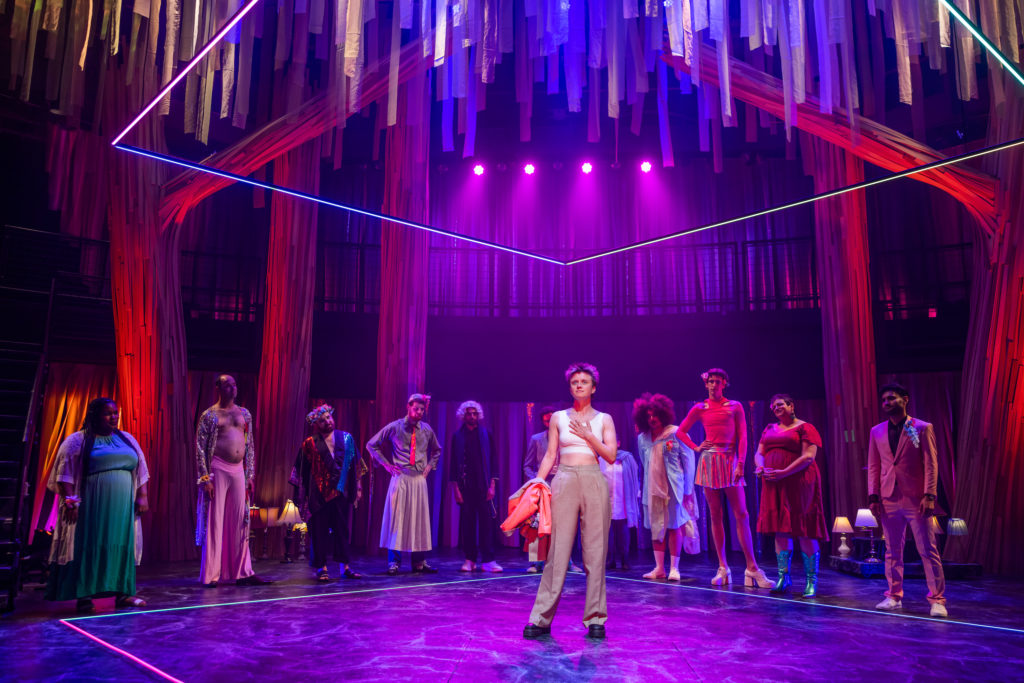
Genevieve Simon and the cast of Actors’ Shakespeare Project’s As You Like It (2023). Photo by Nile Scott Studios.
Presented by Actors’ Shakespeare Project in partnership with The Theater Offensive
Directed by Harold Steward
Associated Directed by Brooke Hardman
Featuring Fady Demian, Lindsay Eagle, Gabriel Graetz, Jaime Josè Hernández, Doug Lockwood, Nathan Malin, Gavin Rasmussen, Genevieve Simon, Bobbie Steinbach, Regine Vital, Mishka Yarovoy
June 2 – 25, 2023
Tufts University’s Balch Arena Theater
40 Talbot Ave
Medford, MA 02155
Critique by Craig Idlebrook
MEDFORD, Mass. — At first glance, Actors’ Shakespeare Project’s declaration that its production of As You Like It “leans into (the play’s) famed crossdressing mayhem and gender euphoria” in defiance of the passage of anti-LGBTQ+ legislation could be as empty a stretch as a corporate Pride Month initiative. After all, As You Like It already is one of Shakespeare’s gender-bending plays, in which female protagonists find reasons to dress as men, woo men as men, and then be wooed in turn by women. Add to this that men played all the female parts in the original runs of these comedies, and on paper it seems like there would be little space to add more LGBTQ+ focus.
That is why it is all the more impressive that this production, done in partnership with The Theater Offensive, finds new ways to turn this absurd play into a weapon against the absurdity of a new wave of anti-LGBTQ+ hate.
The play centers on Rosalind (Genevieve Simon), the offspring of a fallen noble (Gabriel Graetz), who is forced to flee to the countryside…just after falling for another fallen member of the court, Orlando (Mishka Yarovoy). For flimsy-at-best reasons, Rosalind disguises as a boy and convinces Orlando to practice wooing “him” to prepare to woo Rosalind. Along the way, Rosalind and her ritzy friends get to know the locals, who provide their own love triangles for our amusement. There also are a pair of fools who provide tomfoolery and biting commentary, and the whole thing wraps up in a mega-wedding.
The production declares its purpose as an act of LGBTQ+ resistance with an added prologue that attempts to place this play among many other acts of defiance. The monologue is said matter of factly, but with just the right “no fucks given” attitude to elicit howls of support and delight from the audience.
All the good intentions of this start would have fallen short were it not that this production is deeply proficient in its source text. The action is crisp, the archaic language is spoken with deep understanding, and there is a feeling that each member of the cast knows how to pull together.

Gabriel Graetz, Bobbie Steinbach, and Lindsay Eagle in Actors’ Shakespeare Project’s As You Like It (2023). Photo by Nile Scott Studios.
Bobbie Steinbach owns the stage as Jaques, a not-so-merry member of the exiled band. Steinbach oozes understated melancholy and hard-earned wisdom in each moment she steps on stage, and provides an accessible, warm, and world-weary delivery that is reminiscent of Judi Dench in the heyday of her late-career renaissance.
Genevieve Simon and Regine Vital (Celia) also are a delight together, with Simon carefully earning each of Rosalind’s comedic beats, while Vital picks her moments to create perfectly timed asides. Together, the two make us believe they are two friends who have grown up together and have forever been each other’s wingman.
If there is one distraction, it is the overhead lighting, which creates a square border on stage. This is the sole adornment during the first scenes in a noble’s court, and likely is supposed to underline the environment’s sterility before our heroes escape to the woods and throw off the shackles of society. Such lighting would work if the box were to disappear once the action shifts to the woods. As it stands, the box left me distracted, wondering if there were rules of engagement with the square box on stage, and whether it was bad luck or a mistake to step on it.
This play ultimately excels because the cast is able to create a finely crafted sense of camp, which, when done right, can provide commentary that bites a layer or two deeper than mere comedy can. It’s difficult to put a finger on exactly how this cast pulls this off, but I would hazard it comes, ironically, from authenticity.
It is evident in their performances that many of this cast feel comfort in questioning the construct of binary gender identity and have experience in the fine points of passing and drag. They let their lived experience speak for itself, and this assuredness helps us see new levels of absurdity among the characters on stage and the social norms they are flailing to uphold. Concepts of class, slumming, lust, love, and, of course, gender, are held up for the audience’s examination, and we are left better for the experience.
In short, this is the kind of production of As You Like It that could get the original text banned in the state of Florida, and that is one of the highest compliments you can give to art in this terrible time of hate.
